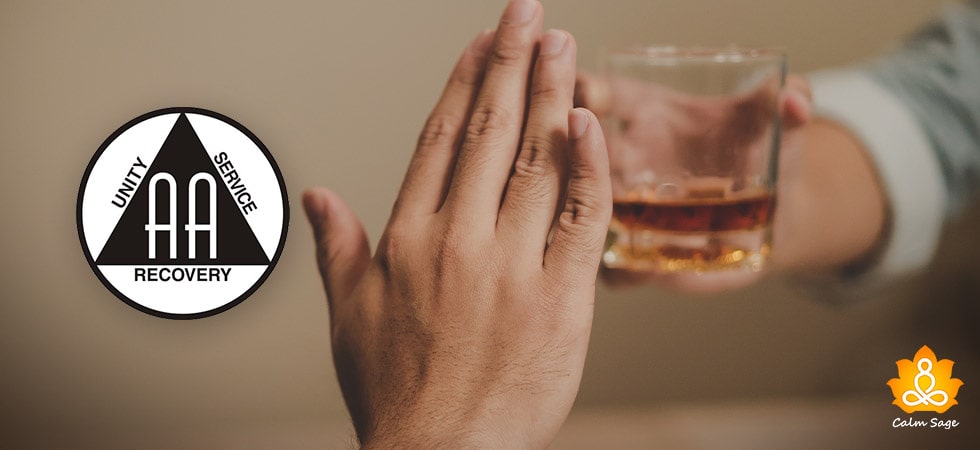12 Steps of Alcoholics Anonymous – A Way to Recovery

Addiction to anything is not good. Be it drugs, alcohol, or anything for that matter, it never helps. It hampers personal, professional, and overall well-being. This is why working on ways to overcome addiction is important.
In 1935, Bill Wilson, a stockbroker in New York, and Dr. Bob Smith, a surgeon who both were alcoholics, developed a self-help group called Alcoholics Anonymous.
In this recovery support group, people struggling with alcohol addiction and wanting to recover from it come together and seek support. However, nothing works without rules.
Hence, they developed a Twelve Steps framework to help alcoholic addicts walk toward the path of recovery. In this post, we will talk about it and how it has helped people globally.
How Alcoholics Anonymous Work?
Alcoholics Anonymous, popularly known as AA, is a way to help addicts recover from addiction and maintain sobriety. Anyone who wants to quit drinking can join an AA group.
Once they have joined the group they can share their experiences, and listen to the stories of others to get motivated. Most importantly they need to have faith and believe that they can recover.
If they don’t want to recover or don’t consider that they have a problem, then things might go sideways for them. Unlike other recovery groups where trained professionals lead the group, the alcoholics themselves run the group and help others like them.
Although the group is based on spirituality and has religious roots, no one is forced to follow or believe in specific religious practices. Each group member is free to follow their own beliefs and have their definition of God, giving them the power to make their own decisions, which makes AA special.
The members of this group can work with or without a sponsor.
Note – A sponsor is a person who has been sober for more than a year and attends meetings. This person, by following the Twelve Step framework, provided guidance, help, and support to other members of the AA group.
But what are these 12 steps? Well, this is what we will discuss in detail in the next section.
The Twelve Steps of Alcoholics Anonymous
Even though the original Twelve Steps of AA have changed over time, the core idea remains the same.
Here we explain the 12-step model so that you or anyone you know who wants to get sober and recover can adopt them and live a fulfilled life. Here are the twelve steps:
Step 1: Recognizing Powerlessness
The journey to recovery begins with acknowledgment. Once the alcoholic accepts that they have no control or power when it comes to alcohol or any other drug addiction, handling things becomes easy.
As one accepts, they need help and don’t have the power to resist the urge, opportunities for self-awareness open up, leading to the path of recovery.
Step 2: Belief in a Higher Power
In this step, the individual needs to be aware of the fact that there is a power greater than themselves, and it is there to help them recover from addiction.
Recognizing and believing in the higher power provides strength and guidance, nurturing hope and resilience along the path toward recovery.
Step 3: Surrendering Control
Most people addicted to drinking think they are the ones in charge and can control how much they drink. Due to this, they often are in a state of denial and never agree that they have a problem.
Once they are willing to surrender to the higher power and accept that there is an addiction problem, it gets easy to put a limit and seek guidance from the higher power who is there to guide each individual.
Step 4: Searching for themselves
This phase is where the person needs to do an honest and rigorous self-assessment. The steps ask the person to reflect upon their character and actions.
When the addict gets into this retrospection, they are able to see their own journey and the personality traits they have adopted by walking on the path of addiction.
Also, this helps them see their weaknesses and work on them so that they can overcome alcohol dependency and change their behavior.
Step 5: Confession
This step involves acknowledging our wrongdoings to God, ourselves, and another person. The person needs to address the struggles they have gone through because of addiction and how their behavior might have affected others and themselves. Confessing to the sins, wrong actions, inappropriate approaches is an essential step towards sobriety.
Step 6: Becoming One
Acknowledging the fact that there is an alcohol problem, and there is a higher power that can help curb it helps make a connection with that power. When one honestly reflects and accepts the vulnerabilities, they are ready for intervention.
Walking on this path might be challenging but as there is acceptance and admittance to powerlessness over negative behaviors that flaws are revealed and working on them becomes easy.
Step 7: Making Amends
“Humbly ask Him (God, inspiration, etc.) to remove our shortcomings.” Embracing humility is the central aspect of this phase.
When facing the emotional challenges brought about by engaging with Step 7. Regardless of whether it’s appealing to a deity or a non-religious beacon of hope, one must come to terms with their limited control over their battle with alcohol dependence.
Step 8: Take Responsibility For Your Actions
In this step, the person needs to make a list of people they might have hurt and should be open to apologizing to them. This can be challenging assuming they don’t think they have done anything and need to make peace.
However, when the person accepts powerlessness and surrenders, then it gets easy and can reflect on what might have happened and gone wrong as they were so much into alcohol that they stopped paying attention to how others might feel due to their actions.
When an individual is under the influence of substance abuse their actions are guided by the addiction. Step 8 makes them realize it and helps them take responsibility for the actions that might have hurt others.
Step 9: Willingness
An individual must be prepared to take necessary actions to rectify their past, as long as such actions do not inflict new or further damage. Working on this step requires a readiness to face any harsh repercussions it may bring.
For instance, if reconciliation involves confessing an old mistake, one should accept the possibility of imprisonment in pursuit of healing and rehabilitation.
Spiritually, this stage calls for individuals to draw upon higher forces and their program peers for the fortitude and insight needed to act honorably. To truly make amends, earnest attempts at expressing regret are essential.
The process involves self-forgiveness and forgiving those who have caused them harm in return.
Step 10: Inventory
This step is sometimes challenging to define as it requires making a note of everything that the person did wrong. It involves hurting others, misbehaving, making mistakes, telling lies, etc.
Thinking about all such things can be overwhelming and the person might not want to accept what all went wrong.
However, once the person is ready to take responsibility, it becomes easy to recover from alcohol addiction. Say you have a habit of getting angry when no one listens to you. After following this step, you will see that this anger helps no one.
So rather than getting angry you will now try to understand others’ points of view and will respond peacefully.
Step 11: Reach Out to The Source of Inspiration
This step suggests that individuals seek guidance from a higher power, be it God or another form of spiritual upliftment, to gain the fortitude necessary for their path to sobriety.
Participants are urged to acknowledge their Higher Power’s presence, heed its direction, and permit this divine influence to steer them in their healing odyssey via devotion and contemplation.
Step 12: Spiritual Awakening
To successfully move forward with this step, it is crucial to undergo a transformation that arises from completing the 11 steps. In this last step, you need to spread the message of AA and help as many people as you can.
Some think of this step as demanding but that is not the case. Through this step, addicts are being motivated to stay sober and help others. As they spread the message and make others aware of the Twelve step framework, they are able to recall all the learnings and work on it so that the sobriety stays. Also, the acknowledgment of battles won is always there giving a sense of pride.
Advantages of Alcoholics Anonymous
The advantages of participating in AA include;
- Increased likelihood of maintaining sobriety
- Improved social functioning
- Enhanced self-confidence
- Reduced healthcare expenses
Alcoholics Anonymous a Blessing To Recover From Addiction
AA has proven effective in helping many individuals achieve and sustain sobriety. However, identifying elements that contribute to its success remains challenging. Different members may find value in aspects of the program. Still, there are certain factors that have always helped and shown how effective AA is.
Alcoholics Anonymous helps stay connected, create connections, find a purpose, gain confidence, stay sober, build healthy relationships, engage in acts of kindness, encourage others who want to recover, and a lot more.
Some might be attracted to AA as they want to recover, some because they want to help others, and some as they want to have good relationships. The purpose of joining AA will be the same to be sober but the ulterior motive can be different as AA is a multifaceted recovery journey.
Moreover, the 12 Steps of Alcoholics Anonymous is not a recovery program. It is a guide to embracing a new way of living. By adopting these principles, individuals can find comfort, inner strength, and a supportive community as they strive for lasting sobriety.




















